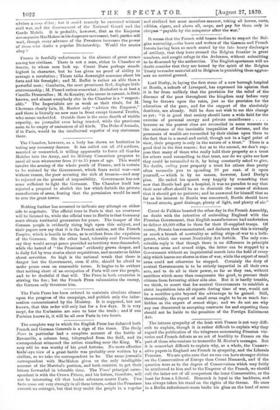Count de Palau) boasted the other day in the French
Assembly, no doubt with the intention of embroiling England with the Prussian Government, that English manufacturers had undertaken to deliver 40,000 rifles to them for their ill-supplied troops. Of course, Prussia has remonstrated, and declares that this is virtually as much a breach of neutrality as selling ships-of-war to a belli- gerent, which our recent Neutrality Act forbids. The only con- ceivable reply is that though there is no difference in principle between arms and armed ships, the latter can be stopped by a Government without an inquisitorial search into the hold of every ship which leaves our shores in time of war, while the export of small arms could not otherwise be stopped. Certainly the duty of neutral Governments is to be strictly impartial in all their own acts, and to do all in their power, so far as they can, without sacrifices which more than compensate the good, to prevent their citizens from favouring either side also. But it is hardly tenable, we think, to assert that for neutral Governments to establish a strict inquisition into all exports during time of war, would not be a sacrifice quite beyond the advantage to be gained. Still, theoretically, the export of small arms ought to be as much for- bidden as the export of armed ships ; and we do not see why any one discovered in accepting contracts for and exporting them should not be liable to the penalties of the Foreign Enlistment Act.






























 Previous page
Previous page